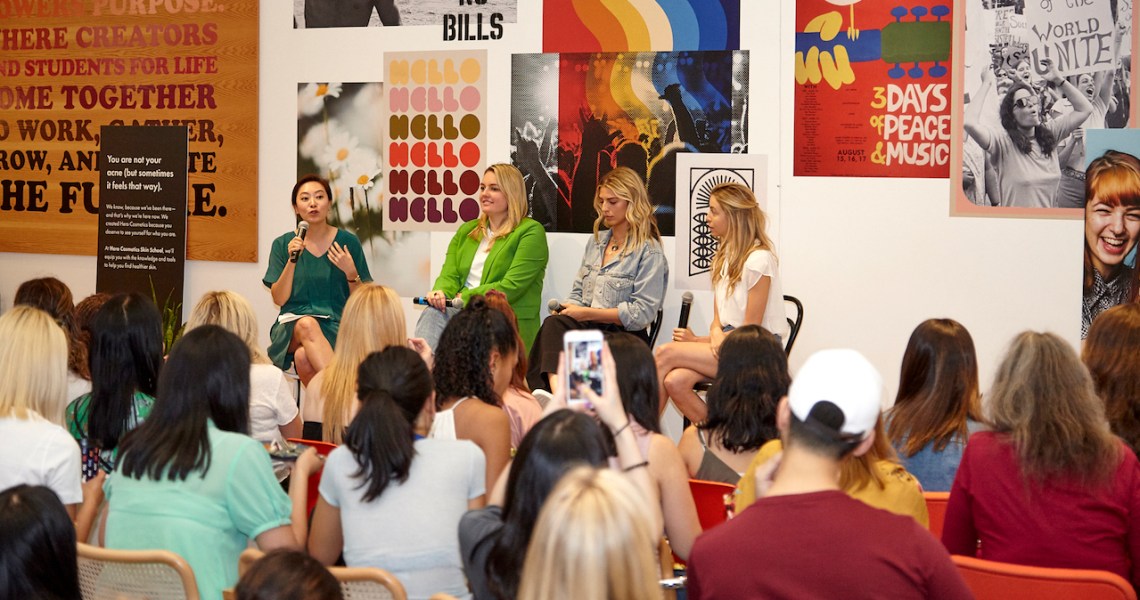Hero Cosmetics, which is best known for its overnight acne patches, is rolling out a marketing campaign throughout June that focuses on how environmental factors and self-care affect acne. The purpose is to carve out a place within the wellness movement.
Throughout June, which happens to be Acne Awareness Month, Hero is taking a three-pronged approach to delivering its message. It started with a wellness-themed gift with purchase (that included ingestible brand Liquid I.V. and essential oils company Way of Will) on HeroCosmetics.us on June 3, which extends to the end of the month, and a monthlong influencer campaign on its social and digital channels. Additionally, it hosted an educational event at WeWork’s Made By We coworking space on Tuesday in New York City. The focus of the campaign is to identify factors contributing to acne to establish Hero Cosmetics’ inner-outer beauty connection and role in holistic acne care.
The brand is on track to do $5 million in sales this year and is largely sold at Anthropologie, Neiman Marcus and Riley Rose — it expanded in the first quarter to Liberty London in the United Kingdom. E-commerce sales currently account for 5% of the business, said Ju Rhyu, Hero Cosmetics founder and CEO; this campaign is part of a plan to boost that number to at least 15% by the end of the year. The company is also currently exploring new product launches beyond acne patches, but declined to provide more details.
“We are moving in a more ‘wellness’ direction; we want to see how our customers respond and get their feedback,” said Rhyu. “[While] I don’t have a three-year road map yet, we may become more of a lifestyle-oriented company.”
This wellness campaign is the largest push for Hero Cosmetics to reroute customers to its website. The gift with purchase is a “compelling” offer to push the needle on DTC sales, Rhyu said. On Tuesday, the brand also held a skin-care education event in New York City, attended by approximately 50 people. The event consisted of a panel with wellness and body-positive influencers including Jera Foster-Fell (160,000 followers), Lili Hayim (85,700 followers) and Jessica Young (6,500 followers), and focused on how to live a well-balanced life to fight acne. Hero Cosmetics also streamed the event through Instagram Live to its more than 9,300 followers.
The influencer campaign consists of 30 micro-influencers with followings between 2,500 and 50,000 people, who were selected through influencer platform JoinPalm. These unpaid influencers are gifted free Hero Cosmetics products and asked to post one blog post and one Instagram story using the hashtag #juneacneawarenessmonth to magnify the brand’s awareness. The promotion is a partnership between Hero Cosmetics, birth control company The Pill Club and supplement brand Hum Nutrition. The partner companies will distribute samples of Hero Cosmetics products to their own customers throughout June as a sample option during checkout, a similar program it began employing in October 2018 meant to draw people to its e-commerce channel.
The wellness movement has consistently trended upward since 2004, reaching a peak in February 2017, according to Google Trends. In many ways, it’s become table stakes for brands to associate themselves with wellness; skin-care brands are especially eager to latch on to the opportunity. While Rhyu does not believe beauty brands have to align with wellness, there are many that are doing so to remain relevant, such as Foreo, Sunday Riley and Herbivore.
Ad position: web_incontent_pos1
For Hero Cosmetics, the interest in wellness stems less from a bid to use wellness to directly sell products, but more as a way to build customer trust and loyalty. Currently, 30% of all Hero Cosmetics ecommerce sales come from repeat purchasers.
“I’m pretty confident that our product and moving into this wellness direction will only strengthen the trust a customer has with us. And because of that trust, they will continue to buy our product or refer people,” Rhyu said. “Not enough acne brands are discussing the [factors that contribute to acne]. We want to shed more light on lifestyle factors so that we can be a brand that stands for acne solutions in all respects.”
Building trust with beauty customers has become more important over time, as customers increasingly demand brand transparency and expect authenticity, according to the Fashion Institute of Technology. Legacy brands that sell acne products, like Proactive, St. Ives and Neutrogena have been criticized for having too harsh of products and opaque business practices, representing an opportunity to capture market share.
But using the wellness industry to fill a transparency gap is also a thorny issue. The wellness industry as a whole has been widely mocked and called out for surreptitious rebranding of age-old industries, like weight loss and fitness. With acne specifically, while environmental factors such as air pollution and stress can lead to breakouts, but the biggest contributor is still a genetic predisposition, said Genevieve Vielbig, a nurse at med spa Just Ageless in New York City.
“All acne is not created equal, and there is no magical cure for individuals with acne,” she said. “Acne is misunderstood by many, especially adult acne. It has been oversimplified by the wellness industry, and often acne is masking a much deeper issue of a hormonal imbalance or genetics.”




